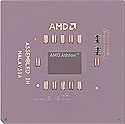Athlon 800Mhz Processor Review
The AMD Socket A Athlon CPU's is the PIII
alternative for computer users demanding high-end performance, but without the high
price tag that is usually attached to it. Without a doubt, the Socket A
(Thunderbird) AMD CPU's are the best price/performance buys on the market today.
While prices are relatively cheap, the performance of AMD's Athlon CPU's is
hardly anything to scoff at. AMD has managed to fuse many of the
consumer ideals into their high-end CPU lineup, fast, stable,
and affordable. Today we'll be looking at AMD's 800 Mhz Athlon.

AMD Athlon Socket A Thunderbird 800Mhz
: $108 USD / $165 CDN
As a quick
overview, the Thunderbird series of Athlons represents AMD's answer to the
1:1 core to cache speed ratio Pentium III's (Coppermine) that
have been available for quite some time now. I can recall when
the Pentium III Katmai (512K cache half speed cache) CPU's were getting
beaten around by the old Slot A Athlons (with 512K variable speed cache).
Intel answered with their 256KB 1:1 core to cache speed Pentium III's. They were
able to outpace the current Athlons at the time because the 256KB
of L2 cache on the new Pentium III's allowed Intel to take the
performance lead over the Athlon. Now we are at a time where the Pentium III,
and Athlon are fighting on a more even ground (in regards to L2 cache speed
and size). Unfortunately for Intel and the Pentium III, the Athlon does have some other obvious
advantages (aside from price). And that is the fact that the Pentium III
only has 32KB of L1 cache, and the Athlon has
128KB. Coupled with the fact that the Athlon has a faster and more advanced
floating point unit, as well as a faster 100 Mhz DDR bus, it'll be hard
for the Pentium III to keep up with it. And oh yeah,
Pentium III's are realistically topping out at 933Mhz, mostly because the 1Ghz models are
still relatively hard to find, and are priced well beyond the reach
of most consumers. 1Ghz Athlons are readily available, and are quite affordable ($175 USD /
$262 CDN). Nonetheless this is an Athlon 800Mhz review,
not a 1Ghz review... but that's where overclocking shall come in.
AMD Athlon Processor Overview
The
AMD Athlon processor is among the world's most powerful engines for PC
computing, and represents the industry's first seventh-generation x86
microarchitecture. The AMD Athlon processor family is designed to power the next
generation in x86 computing platforms. It meets the computation-intensive
requirements of cutting-edge software applications running on high-end desktop
systems, workstations, and servers. All AMD Athlon processors are now produced
using 0.18-micron process technology.
The AMD Athlon processor provides exceptional processing power on real-world,
mainstream Microsoftr Windowsr compatible software, as well as
computation-intensive applications for high-end desktops. These high-end
workstation applications include digital photo editing, digital video,
commercial 3D modeling, image compression, soft DVD, CAD, and speech recognition
.
Features:
|
Microarchitecture: The AMD Athlon
processor features a superpipelined, nine-issue superscalar
microarchitecture optimized for high clock frequencies. The AMD Athlon
processor contains a total of nine execution pipelines: three for address
calculations, three for integer calculations, and three for executing x87
(floating point), 3DNow!"! and MMX"! instructions.
System Bus:The AMD Athlon processor's
system bus is the first x86 platform bus running at or
above 200MHz. At present, AMD Athlon processors are available with 266MHz
and 200MHz system buses. As one of the fastest x86 processor buses
currently available, the design delivers as high as 100 percent more peak
bandwidth than any x86 system bus. It is designed for scalable
multiprocessing and leverages high-performance Alpha"! EV6 bus technology
to enable exceptional system performance.
Floating Point Engine: The AMD Athlon
processor includes the first fully pipelined, superscalar floating point
engine for x86 platforms. The resulting floating point capability is the
most powerful ever delivered in an x86 processor.
Enhanced 3DNow!"! Technology: The AMD
Athlon processor's enhanced 3DNow! technology takes 3D multimedia
performance to incredible heights and builds on the 21 instructions of
AMD's original 3DNow! technology-the first x86 instruction set to use
superscalar SIMD floating point techniques. Enhanced 3DNow! technology
adds 24 instructions-19 to improve MMX integer math calculations and
enhance data movement for Internet streaming applications and 5 DSP
extensions for soft modem, soft ADSL, Dolby Digital, and MP3 applications.
Cache Architecture: The AMD Athlon
processor boasts a 384K total full-speed on-chip system cache including
128K L1 cache--four times that of Intel's Pentiumr III processor--and 256K
on-chip full-speed L2 cache. This performance-enhancing cache design helps
boost overall system performance.
|
All of this information is quite interesting,
but how well does it really stack up? Read on to see the 800Mhz SiSoft Sandra
scores. But first, our test setup:
Test Machine:
AMD Athlon 800Mhz with Global Win FOP
cooler (27.2 CFM) fan.
ABIT KT7 RAID Motherboard
2x128MB Infineon PC-133
RAM
Asus V7700 Geforce 2 Video card @ 235Mhz/ 365Mhz
And some
other stuff that do not really factor into the benchmarks.

